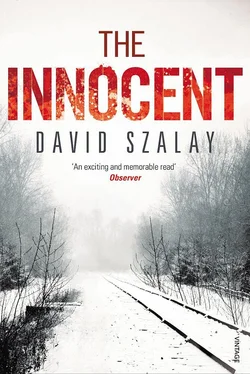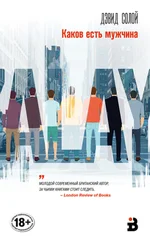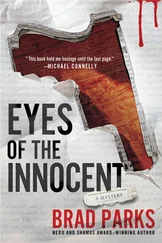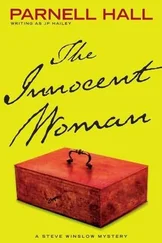Дэвид Салой - The Innocent
Здесь есть возможность читать онлайн «Дэвид Салой - The Innocent» весь текст электронной книги совершенно бесплатно (целиком полную версию без сокращений). В некоторых случаях можно слушать аудио, скачать через торрент в формате fb2 и присутствует краткое содержание. Город: London, Год выпуска: 2010, ISBN: 2010, Издательство: Vintage, Жанр: Проза, на английском языке. Описание произведения, (предисловие) а так же отзывы посетителей доступны на портале библиотеки ЛибКат.
- Название:The Innocent
- Автор:
- Издательство:Vintage
- Жанр:
- Год:2010
- Город:London
- ISBN:9781448103232
- Рейтинг книги:5 / 5. Голосов: 1
-
Избранное:Добавить в избранное
- Отзывы:
-
Ваша оценка:
- 100
- 1
- 2
- 3
- 4
- 5
The Innocent: краткое содержание, описание и аннотация
Предлагаем к чтению аннотацию, описание, краткое содержание или предисловие (зависит от того, что написал сам автор книги «The Innocent»). Если вы не нашли необходимую информацию о книге — напишите в комментариях, мы постараемся отыскать её.
The Innocent — читать онлайн бесплатно полную книгу (весь текст) целиком
Ниже представлен текст книги, разбитый по страницам. Система сохранения места последней прочитанной страницы, позволяет с удобством читать онлайн бесплатно книгу «The Innocent», без необходимости каждый раз заново искать на чём Вы остановились. Поставьте закладку, и сможете в любой момент перейти на страницу, на которой закончили чтение.
Интервал:
Закладка:
While Lovkach eats, he wanders through the flat. On a table in the hall – over which hangs a deluxe portrait of Lenin under a picture light – there is some unopened mail, and invitations to official functions propped on the wall, and two tickets to the Sverdlovsk opera. Mozart’s Don Giovanni . For tonight, he notices – Friday, 29 September 1972. (Ivan is no opera buff – it is the sort of thing that Agata would want to do.) There are framed photographs of Ivan’s four children at various ages.
The living room is very large. Nevertheless, it is somewhat shadowy. The curtains are heavy green velvet. The furniture is sombre. From the far end, the fat television stares. There are shelves filled mostly with the works of Marx and Lenin in fine leather editions. There is an expensive Czech sound system, and some Western LPs, probably purchased in Yugoslavia. A malachite ashtray. Some journalism awards in frames on the wall. A black-and-white photo of Ivan meeting Kosygin, part of a line-up of nervous provincial journalists, smiling and shaking his hand.
He slides open the terrace door and steps outside – the sharpness of the air is a shock after the well-heated flat. From the eighth floor, looking south-east, the lowlying city spreads out under white plumes of steam. The sky has a frosty shimmer. He looks for landmarks. Lenin Prospekt is an obvious one. And the lake, shining like polished metal – on the other side the park has turned yellow. The traffic noise is thin.
22
THE FOURTH DEPARTMENT hospital, once the suburban villa of a Yekaterinburg industrialist, is surrounded by a high wall. The wall is old now, buckling in places, flaking, eaten by damp, discoloured. Over the brown barbed wire that spirals along its summit are the bare branches of mature trees. A young soldier – a teenager with a shadow moustache – stands at the gate, holding a machine gun in his mittened hands as if he is not sure what it is. He looks worried when Aleksandr walks up to him. Few people arrive here on foot – there are ambulances, long Zil limousines, minibuses full of staff. Solitary people who have walked from the tram stop on Volgograd Street, however, are seldom seen. When Aleksandr says who he is, the soldier withdraws into his tar-paper hut and, eyeing his elderly visitor suspiciously through its scuffed plastic window, picks up the phone. It is a dull October afternoon.
The exterior of the hospital is shabby, the paintwork falling off in stiff pieces. Not so the interior. Polished parquet floors, a faintly medicinal smell, the quiet of a university library. In the foyer, Aleksandr unwinds his scarf and takes off his astrakhan hat. It is old now, its elegantly shiny surface losing its profound lustre, starting to separate into stiff individual hairs; its satin lining fraying to show the simple felt underneath. It was a present from Irina. Her last to him, for his birthday in February forty-eight.
Ivan is sitting up in bed, propped on a pile of pillows, surrounded by newspaper pages and sweet wrappers. He is holding a newspaper, and peering at it through heavy-framed spectacles. The radio is on – a serious female voice, the news – and Aleksandr Ivanovich sits easily in a velvet armchair, still in his soft overcoat, trying successfully to impress his father by translating the German text on the packaging of some pharmaceuticals. They both turn to the door when Aleksandr enters.
‘Sasha!’ Ivan says, whipping off the large spectacles and slipping them into the breast pocket of his pyjamas. Aleksandr Ivanovich puts down the West German medicine and smiles, though without warmth. He leaves soon afterwards. ‘See you tomorrow, Dad,’ he says, leaning over to kiss Ivan.
‘Yes, see you tomorrow, Shurik.’
When he has left, however, Ivan says, ‘I won’t see him tomorrow, of course.’
‘Oh? Why not?’ And then, when Ivan says nothing, ‘It’s tomorrow, is it?’
‘Tonight.’
‘Well, you’ll see him the day after then. How long is he here for?’
‘In Sverdlovsk? I don’t know.’
‘And Galina?’
‘Yes, she was here this morning.’ Ivan sighs. ‘She brought me that. Very kind of her.’
There is a trug of fruit, including a small fresh pineapple, on a side table.
‘I’m not allowed to smoke,’ Ivan says, unwrapping a sweet, while Aleksandr studies the spiky-topped fruit. Though he has tasted it in tins, in its natural state it is something new to him. ‘You’re not allowed to smoke?’ he says. ‘That’s not surprising.’
‘I eat these to try and take my mind off it, but it doesn’t work.’
Aleksandr puts down the pineapple. ‘How are you feeling?’ he says.
‘Okay. Fine, actually.’
‘You look well.’
‘Do I?’
‘Yes.’
In fact Ivan looks puffy and his face has a suffocated purplish hue; even speaking seems to leave him slightly short-winded. ‘I feel fine,’ he says. ‘And I tell them that. I tell them.’
There is a small possibility that he will not survive the operation. The doctors are quite open about it. They say that without it another heart attack is almost inevitable. For the last few weeks, he has been totally sedentary, has slept with an oxygen mask strapped to his face; it has left a stipple of irritation around his mouth. He picks up one of the newspapers that surround him, and then immediately puts it down. ‘How are you?’ he says.
Aleksandr shrugs.
On the radio, the serious woman says that, following the signing of the US–Soviet trade pact on 18 October, Armand Hammer, the president of the Occidental Petroleum Corporation, is in Moscow. Sounding very slightly proud, she says that Mr Hammer has presented the Soviet Union with a Goya painting ‘worth one million dollars’. Negotiations on a trade package will start imminently, and will be finalised, it is hoped, in time for Brezhnev’s visit to the United States in the spring of 1973 …
‘Do you mind if I turn it off?’
‘No.’ In his nest of newspapers, Ivan shakes his head, his thoughts elsewhere. ‘No.’ Aleksandr turns off the radio, and in the sudden silence sits down on the velvet armchair. They talk for a while.
When he leaves it is late afternoon. The old stairs squeak under his feet in the oak-panelled stairwell. Outside wet snow is starting to fall. It forms a thin slush on the dark tarmac of the drive, settles frailly on the sombre cedars that surround the hospital. A light is on in the soldier’s hut. It is a long walk to the tram stop. And then, in this suburb, he might have to wait forty minutes for a tram.
23
HE MARRIED AGAIN in 1960, twelve years after he and Irina were divorced – Serafima, a KGB colleague, a small, softly spoken woman, whose first husband was a war hero who died at Stalingrad. 1960 was the time of his troubles with the Lozovsky case – the tribunal – and she was strongly opposed to his treatment. Politically, they were on the same side. It was the functional marriage of two people in their late forties, without too many illusions left, and the divorce, in 1964, was perfectly friendly. For a few years, he still saw her quite often. He never saw Irina in the same way. She moved to Moscow, where one of her younger sisters was married to someone important. Sometime in the late sixties she must have moved back to Sverdlovsk – one day he saw her in the park near 1905 Square, feeding the pigeons. He had not seen her for twenty years, not even at Nikita Stepanovich’s funeral.
He was sitting on a bench under the trees – it was his lunch hour – when he noticed the middle-aged woman feeding the pigeons. Though it was summer, she was wearing a grey raincoat, and her hair was grey, and every few moments she put her hand into the plastic bag she was holding and threw more crumbs to the pigeons. Filthy and flapping, they entirely surrounded her. It was only when she turned to leave that he saw her face, and then only for a second. He watched her walk away. She still walked the way she used to. When she was almost out of sight, he stood up and started to follow her. She was some way ahead, and in the sunlight of Lenin Prospekt she quickened her pace. Still in the shade of the park he tried to do the same. He would not have been able to whisper her name, much less shout it out. There was a tram standing at the stop. That was why she had started to jog. The doors shut, she hit them and they opened again. The tram moved off. He stood on the pavement of Lenin Prospekt, frighteningly light-headed. The sun was in his face. He did not feel well.
Читать дальшеИнтервал:
Закладка:
Похожие книги на «The Innocent»
Представляем Вашему вниманию похожие книги на «The Innocent» списком для выбора. Мы отобрали схожую по названию и смыслу литературу в надежде предоставить читателям больше вариантов отыскать новые, интересные, ещё непрочитанные произведения.
Обсуждение, отзывы о книге «The Innocent» и просто собственные мнения читателей. Оставьте ваши комментарии, напишите, что Вы думаете о произведении, его смысле или главных героях. Укажите что конкретно понравилось, а что нет, и почему Вы так считаете.












